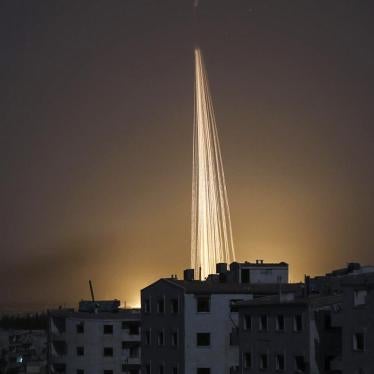Thank you Madame Chair. This statement is delivered on behalf of 34 organizations.
Incendiary weapons, widely criticized for their cruel effects, remain a matter of grave concern in modern warfare.
Israeli armed forces began unlawfully using ground-launched airburst white phosphorus munitions in populated areas of Lebanon and Gaza in October 2023 and have continued since then. The range of harm that Human Rights Watch has documented in Lebanon over the past year shows that white phosphorus not only causes immediate physical and psychological harm but also has socioeconomic and environmental impacts.
During the same period, the use of ground-launched and air-delivered incendiary munitions in Ukraine and Syria has continued.
Protocol III of the Convention on Conventional Weapons (CCW) is the only international instrument dedicated to governing incendiary weapons, but it has failed to achieve its goal to protect civilians. It has two major loopholes. First, its definition does not cover multipurpose munitions, such as white phosphorus, because they are “primarily designed” to create smokescreens, rather than to set fires or burn people. Second, the protocol has weaker regulations for ground-launched incendiary weapons than airdropped ones. All of these weapons, however, produce the same horrific harm.
Momentum to address problems related to incendiary weapons has grown. At the 2023 Meeting of High Contracting Parties to the CCW, a record number of countries—more than 100—expressed concern about the serious consequences of incendiary weapons and called for action. Although these countries represented the majority of high contracting parties, the CCW meeting failed to achieve consensus on this issue.
We urge states at First Committee as well as CCW high contracting parties to:
- Condemn the use of incendiary weapons, including white phosphorus;
- Call on users to cease use of incendiary weapons in populated areas;
- Urgently initiate informal discussions of the adequacy of international law on incendiary weapons and the concerns raised by the weapons; and
- Work to create stronger international standards that better protect civilians. These standards should close the loopholes in Protocol III. A complete ban on incendiary weapons would have the greatest humanitarian impact.
Thank you.
The following organizations have signed on this statement:
- Action on Armed Violence
- Amnesty International
- Anethum Global
- Arms Control Association
- Article 36
- Aotearoa New Zealand Campaign on Military Spending
- Aotearoa New Zealand Network on Explosive Weapons
- Campaign Against Arms Trade
- Campaña Colombiana Contra Minas/Colombian Campaign Against Mines
- Center for Civilians in Conflict (CIVIC)
- Center for International Policy
- Centro de Estudios Ecuménicos (México)
- Conflict and Environment Observatory
- Conflict Awareness Project
- DAWN
- Explosive Weapons Trauma Care Collective (EXTRACCT)
- Gun Free South Africa
- Human Rights Watch
- Humanity & Inclusion
- Legacies of War
- Mines Action Canada
- Non-Violence International–Canada
- Norwegian People’s Aid
- Oxfam
- PAX
- Peace Movement Aotearoa
- Perú por el Desarme
- Protection
- Saferworld
- Scientists for Global Responsibility
- Seguridad Humana para América Latina y el Caribe (SEHLAC)
- Swedish Peace and Arbitration Society
- Women’s International League for Peace and Freedom (WILPF)
- Women for Peace and Democracy Nepal








